 Petzlover
Petzlover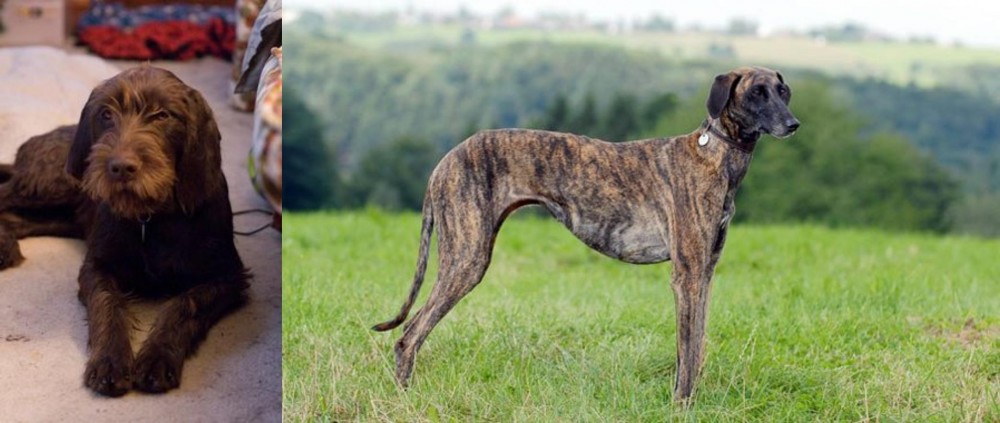 Pudelpointer is originated from Germany but Sloughi is originated from Morocco. Both Pudelpointer and Sloughi are having almost same height. Both Pudelpointer and Sloughi are having almost same weight. Both Pudelpointer and Sloughi has almost same life span. Both Pudelpointer and Sloughi has almost same litter size. Both Pudelpointer and Sloughi requires Low Maintenance.
Pudelpointer is originated from Germany but Sloughi is originated from Morocco. Both Pudelpointer and Sloughi are having almost same height. Both Pudelpointer and Sloughi are having almost same weight. Both Pudelpointer and Sloughi has almost same life span. Both Pudelpointer and Sloughi has almost same litter size. Both Pudelpointer and Sloughi requires Low Maintenance.
 The Pudelpointer is cross between the Poodle and the English Pointer. The first Pudelpointer was bred in 1881 by Baron Von Zedlitz in Germany.
The Pudelpointer is cross between the Poodle and the English Pointer. The first Pudelpointer was bred in 1881 by Baron Von Zedlitz in Germany.
The idea was to bring about a gun dog highly skilled in tracking and retrieving. The Pudelpointer was introduced to North America in 1956, and in 1977 the Pudelpointer Club of North America was established.
Because breeders have avoided recognition by the American Kennel Club, the Pudelpointer never became a well known breed in the United States.
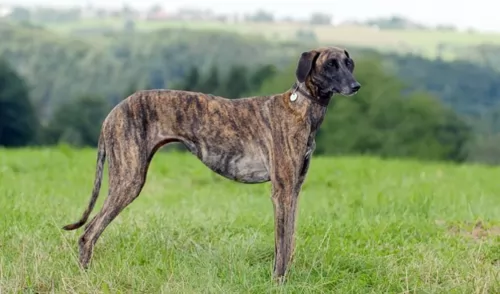 The Sloughi is an ancient dog breed, dating back to the 13th century, and coming from Morocco, North Africa.
The Sloughi is an ancient dog breed, dating back to the 13th century, and coming from Morocco, North Africa.
Much of its history isn’t well known. The dog is a member of the sighthound family. They were originally used for hunting purposes.
The world wars saw their numbers declining. The first Sloughi dog was introduced to the United States in 1973. It was in 1989 that the American Sloughi Association was founded. The dog was also recognized by the American Kennel Club as a Foundation Stock Service breed in 1997. The dog has also been recognized by FCI in the Sighthounds group.
They are rare in the United States and if you wanted to buy one of these dogs you would stand a better chance of looking for a breeder, and then there may be a waiting list.
 The Pudelpointer stands at between 55 and 68cm in height and weighs between 20 and 30kg. He is a medium sized dog with a weather resistant, double-layered coat. The coat doesn’t shed much and is usually a brown, chestnut, liver or black color.
The Pudelpointer stands at between 55 and 68cm in height and weighs between 20 and 30kg. He is a medium sized dog with a weather resistant, double-layered coat. The coat doesn’t shed much and is usually a brown, chestnut, liver or black color.
The coat is usually dense, harsh and wiry. They have floppy ears with quite a unique feature - the mustache on the muzzle. The tail is docked, with about 30% being removed, giving the dog an attractive, distinctive look.
Full of energy, the lively Pudelpointer will love to find himself in a family where they are active, outdoorsy types. He loves water too, and when out on a hike, if there’s water around, he’ll be the first to jump right in.
He’s an intelligent dog too, eager to please and ready to learn. He can easily be trained and socialized. He is loyal, calm and loving and will get on well around children and other animals in the home. He is also protective and makes a good watchdog.
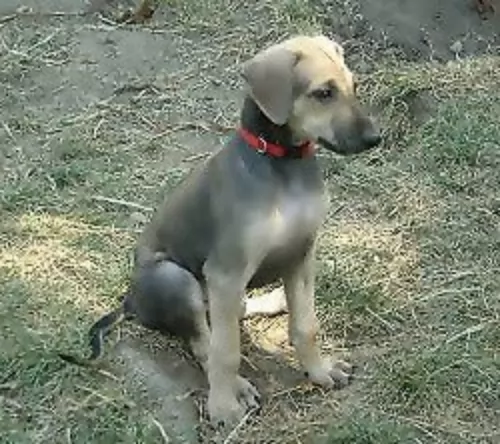 The Sloughi is a big dog, tall and slender. The head is also long and elegant. He stands between 61 and 72cm, both male and female, and he weighs in the region of 18 to 28kg.
The Sloughi is a big dog, tall and slender. The head is also long and elegant. He stands between 61 and 72cm, both male and female, and he weighs in the region of 18 to 28kg.
Looking much like a large Greyhound, the leggy dog has a noble look about him. Known for his hunting skills, he is fast and agile. In fact he is nicknamed the ‘Arabian Greyhound’.
The short straight hair makes him always look well groomed and clean. He sheds moderately throughout the year. Colors of the coat can be a fawn color, sandy, reddish brown or brindle and some come with the black mask and others without. He has medium length floppy ears and a long tail
The Sloughi loves his human family but is essentially a one-person dog. He is affectionate and loyal but can be quite stubborn, Having him trained and socialized does wonders and makes him amicable and well mannered.
He is quiet and intelligent and would prefer to be in a family with older children, and particularly with children who have been taught how to be kind and respectful with animals.
 The Pudelpointer may well be a gun dog but when it comes to his human family he is a social, loving companion.
The Pudelpointer may well be a gun dog but when it comes to his human family he is a social, loving companion.
He is intelligent too and can be easily trained. When at home with his human family, he is calm and content. He will however need lots of exercise and mental stimulation. In exchange for your love and care, he will be a good watchdog, protector, pet and friend.
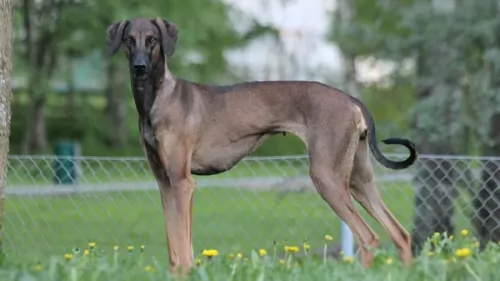 Sloughis are independent, strong willed dogs who will need a firm owner who is consistent, fair and firm.
Sloughis are independent, strong willed dogs who will need a firm owner who is consistent, fair and firm.
They're tall, slender dogs, elegant to look at and low maintenance with their short coats.
They are calm and dignified and when you make one of them your friend, companion and pet, you’re going to enjoy years of devoted companionship and loyalty.
 The Pudelpointer is active and healthy and can live up to 14 years and maybe even longer with good care.
The Pudelpointer is active and healthy and can live up to 14 years and maybe even longer with good care.
Owners will do well to know about a couple of the common dog illnesses that can strike at any time -
Some dogs are more at risk for bloating. Larger dogs with deep chests are at greater risk. To help with preventing this deadly ailment, feed your dog a couple of smaller meals a day instead of one big meal that he gobbles up quickly.
Bloat is a medical condition which comes about with a rapid accumulation of gas in the stomach. Canine bloat or gastric dilatation and volvulus is a killer disease. The accumulation of gas can cause the stomach to twist and the dog can go into shock.
Your dog will be trying to vomit, he’ll be panting and pacing, drooling with a hard, swollen stomach.
This is a common illness or condition seen in many dogs, young and old, large and small.It’s a disease which can lead to pain, arthritis and lameness.
The Pudelpointer has floppy ears and loves swimming. The floppy ears are at risk for developing ear infections. Check inside the ears that they aren’t red or have a discharge. Your dog will be scratching his ears a lot.
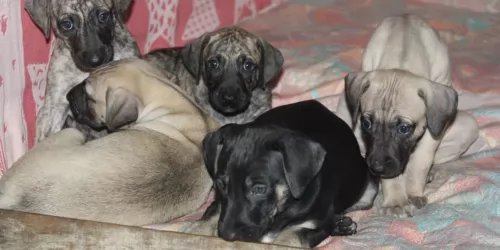 Only a few genetic conditions are found in this breed and these can be the likes of autoimmune disorders such as eye disease, Addison's disease and irritable bowel syndrome.
Only a few genetic conditions are found in this breed and these can be the likes of autoimmune disorders such as eye disease, Addison's disease and irritable bowel syndrome.
These dogs are also sensitive to anesthesia as well as some medications. Other illnesses to look out for with this large dog are cancer, bloat and diabetes.
 Brush your PudelPointer twice a week to get rid of loose hairs.
Brush your PudelPointer twice a week to get rid of loose hairs.
Grooming can be an awesome bonding experience for you and your dog. While you’re brushing him, check him over for any unusual lumps.
Trim the nails if they don’t wear down naturally themselves.
Check inside the mouth for rotting teeth which can be a source of pain and lot of diseases in the body.
Exercise is very important and can come in the form of a walk every day or hikes, swimming as well as ball- and rope games and hide-and-seek.
Provide your dog with a nice warm, comfortable place to sleep.
Your PudelPointer can get to 14 years of age with good food. While you do get some excellent commercially manufactured dog foods, you want to be sure your pet gets some nutritious home-made food too.
Make sure that the kibble is the high quality ones with lots of vitamins and minerals. Boiled chicken, brown rice or pasta and spinach, sweet potatoes and carrots are a healthy choice for your pet – plain and simply just like dogs love it. Chop it up and add it into the dry kibble a couple of times a week.
Some raw meat added in from time to time will help his skin and coat remain healthy. Never leave him without a constant source of fresh, cool water.
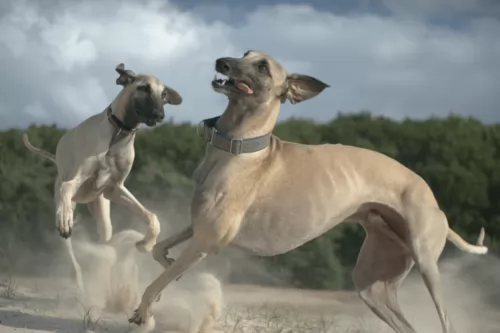 The Sloughi's coat is short and smooth and he also doesn’t have an undercoat. He is looked upon as low maintenance as he just needs a good brush every now and then to rid the coat of loose hairs and to keep him nice and shiny.
The Sloughi's coat is short and smooth and he also doesn’t have an undercoat. He is looked upon as low maintenance as he just needs a good brush every now and then to rid the coat of loose hairs and to keep him nice and shiny.
The Sloughi dog can be fed dry kibble, but it should be a top quality one – one for large, athletic dogs. The dry kibble is useful in that it helps to keep his teeth clean.
To add some tasty variety to your pet’s diet feed him some home made food occasionally. All chopped up, boiled chicken, brown rice or pasta and spinach, sweet potatoes and carrots are a healthy choice for your Sloughi and can be added to the dry kibble. Simple food like this keeps digestive problems at bay.
Try and include some raw meat into the diet as this can help in fighting off horrible skin diseases. Make sure he has constant access to fresh, cool water.
Sloughis love to be active and to have a good run. If you live near a park, allow him off the leash to have a chance to run. Alwys check first though, that it is safe to do so and that your loughi doesn’t try and fight with other dogs off the leashh or accidentally knock over a small child. If you’ve got a big garden, throw a frisbee or ball for him. It is important for him to get a good dose of exercise.